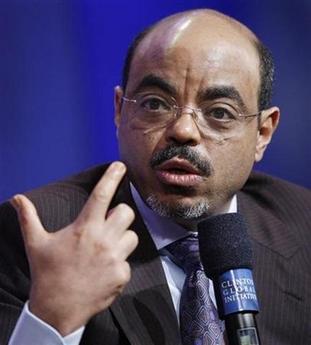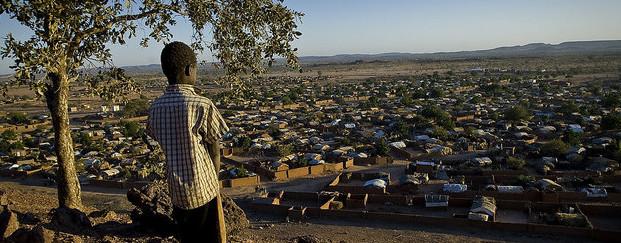Ethiopia and Meles: leadership crisis can become a democratic opportunity – By Alula Alex Iyasu


Uncertainty surrounding Ethiopian Prime Minister Meles Zenawi's health could create an opportunity to reap a democratic dividend in a country already experiencing high economic growth.
Rahm Emanuel , President Obama’s former Chief of Staff, was often heard saying, “A crisis is a terrible thing to waste.” Asked to explain what he meant, he said, “Crisis presents an opportunity to allow you to do things you thought you couldn’t do.”
There is a potential crisis looming in Ethiopia in light of the Prime Minister, Meles Zenawi’s health concerns. Depending on who you choose to believe, Meles is anywhere between speedily recovering to dying. To date, he has taken an indefinite leave of absence from the day-to-day governing. I for one wish the Prime Minster a full and speedy recovery, but if he decided to step aside earlier than the 2015 election as he had previously indicated, the impact of his departure would be enormous to a country of 80 million whom he had ruled with an iron fist for the last 20 years.
Whether you agree with his polices or not, one thing is certain: Meles has been at the helm of a nation which has seen unprecedented economic growth and prosperity rivaling that of China and India.
However, whilst presiding over impressive growth figures, the Prime Minister and his political party (the EPRDF) abdicated their path to democracy, in earnest, sometime back in 2005. This was brought starkly to light when the results of a general election in which the EPRDF faced a strong challenge were reversed through killings and imprisonment of opposition political parties and supporters, a trend which continued in the subsequent election in 2010.
The elections and the resultant shrinking of Ethiopia’s political space turned the Prime Minister from a renaissance leader to pariah by some Western accounts. It also put the Prime Minster and the country in an economic and political conundrum: how to achieve prosperity without democracy? It turns out these seemingly dichotomous points, dictatorship and economic growth, contrary to what we have learned in universities and colleges, are in fact, possible in less than democratic systems. See China. It turns out, also, that the Prime Minister’s views on this are clear, as was shown by his comments at the 2012 World Economic Forum held in Addis Ababa, Ethiopia, in which he said, “There is no direct relationship between economic growth and democracy.”
Let’s assume for a moment that while economic growth is possible under a benevolent dictatorship (which the PM seemed to suggest), what if we then factor in democracy? And I am not talking about democracy-lite, which is a uniquely African phenomenon that begins and ends on Election Day with no substantive policy and regulatory changes to follow. I am talking about a fully-fledged democracy which not only comes with human rights, freedom of speech and the press, but a democracy which embraces free enterprise and a laissez-fair economic doctrine.
Consider this: Ethiopia has been growing at an annual rate of 8.9 percent for the last eight years or so. According to the Economic Intelligence Unit analysis of 2011, the economy is projected to grow by at least the same rate for the next five years. There are more middle income families in Ethiopia today than at any other time in its history. Manufacturing and agribusiness productivity are the highest they have ever been. Ethiopia exports more goods than ever before, led by coffee and soon to be superseded by electric power. The Ethiopian Diaspora from all over the world is returning to its country of birth flush with cash to invest in new enterprises.
And now consider this: Such economic growth is occurring in spite of a deficit in democratic institutions and transparency, inhibited by crippling economic and social policies, unfair and ad hoc taxation and an overall business and investment policy unfavorable to private enterprise. It has largely not taken place because of improvements in economic policies, incentives, democratic institutions or transparency. Above all else, this economic turn-around is testament to the creativity and resolve of the Ethiopian entrepreneur.
The democratic opportunity
The next Prime Minister of Ethiopia should take this potential and impending leadership crisis and turn it into an opportunity – to reform and improve areas hampered by overreaching government policy and an absence of democratic institutions. There is a golden opportunity to view the private sector as a true partner in national economic growth and not an entity to be feared and stymied. An opportunity to encourage public-private partnership as a means to raise capital for the kinds of ambitious development goals Ethiopia has outlined but lacks the funds. An opportunity to create democratic institutions with truly independent bodies that facilitate, arbitrate and encourage entrepreneurship.
And finally, there is an opportunity to attract wide-scale Western investment rivaling that already emanating from China. Beijing has underwritten most of the recent big-ticket investments in infrastructure, telecommunications and power systems. Chinese companies are propped up by the weight of their government at the negotiating tables in Ethiopia and elsewhere in Africa. While money is money to governments, regardless of where it comes from, it would be naí¯ve to assume that the Chinese monopoly in Ethiopia is good for the long-term economic and political sustainability of the country. Democratizing Ethiopia could bring in fresh investments from the West, which recognizes the importance of Ethiopia as a viable emerging market, but is hampered by the country’s record on human rights and democracy.
To the extent that Meles’s successor chooses to liberalise the country’s political and economic space, Western governments would have the political cover to push for the necessary policy and regulatory framework that encourages private investment and partnerships across the Atlantic.
Let’s not forget, all politics is local. Basic economics has also thought us that a diversified investment portfolio is better than relying on a single partner. Attracting Western investors would not only benefit the people of Ethiopia by creating jobs and expanding domestic industries, but it would also give the Ethiopian government leverage against Chinese investments.
While history may prove ambivalent on the democracy versus growth dichotomy, democratic renewal should also be assessed through its capacity to provide a less tangible dividend. This being the potential to unleash the entrepreneurial spirit of a nation by creating the political and economic confidence necessary for investment, while attracting positive attention from currently sceptical western powers.
Alula Alex Iyasu is Managing Director, Bridge International.







Well, finally an encouraging and fresh look at what can be done in the post Meles Ethiopia. All the hate mongering diaspora opposition media have been reporting that the doom of Ethiopia is up on us. However, your view is not only humble, but also understands the actual fact in Ethiopia that the average Ethiopian is not in a mood for an ethnic skirmish, but sweating hard in building individual future and the future of the country. I hope the next PM will understand your theory and will honestly work to accelerate the already started momentum of development.
A well written article and has better insight of Prime Melese Zenawi. Let me hope that by now, they are taking notes of your valuable advice. It is high time to EPRDF leaders to turn their page from a very narrow based socio-economic and political policy to broad based approach and more sustainable ones. We wish him good recovery very soon and healthy for rest of his life. But I wish also to look forward to seeing the PM of my country use this golden opportunity to transfer his power to the RIGHT and LEGITIMATE descendant right now not until his saying end-year 2015. Let us look and go forward on a head of time without looking toward the rear!
Wonderful, thoughtful and positive piece. Just this morning, I was wondering where the reasonable voices in Ethiopian politics were hiding. I fully concur with the central piece of your argument.
I have a few comments though…more comments & questions than answers.
1. You would be suprised to findout that the Ethiopian entrepreneur is not quite as much at the forefront of the economic growth of the last decade. That honor goes to public sector investments…mostly in the services industry. However, this goes more to your excellent point of pushing for a more private sector oriented and hence more stable growth.
2. Your point on the democratic opportunity is very well taken. My question is how? I have a hunch that this democratic transition we speak of is much more complicated than even delivering double digit growth. What’s more, it seems much more time consuming. We simply can’t expect to wake up in a democratic society tomorrow morning. And the biggest issue of all in Ethiopia, how does one overnight create an educated and connected society able to demand its rights?
3. Re: China, I don’t feel Beijing is an important but by no means a monopoly power here. The infrastructure being built here is a result of government budget and many donors including the WB, AfDB, E.U., etc. Further, Chinese investment here is state led. There is some but hardly not as much private investments as you may think. So I feel your fear of a Chinese monopoly is unjustified. The Turkish, the Indians, and even Europeans are in the game.
4. We’re not missing out on Western investment in Ethiopia now because we’re not democratic enough. Afterall, the West is investing heavily in China, isn’t it? By contrast, the countries like Ghana whom we have all started looking upto because of their democratic progress are not getting much Western investment, other than in the usual mining, oil & gas sector of course.
5. Finally, Diaspora flush with cash simply made me laugh. The reality is not so. Few do we see here with large wallet. More importantly, they bring skills and connections.
Ok. That was a lot longer than I anticipated.
Henok A.
It’s hard to tell whether some of the arguments presented in this piece are a reflection of hopeless naivette, intellectual dishonesty, or simple ignorance of the mechanisms that global power structures operate, particularly when statements like this are made:
“Democratizing Ethiopia could bring in fresh investments from the West, which recognizes the importance of Ethiopia as a viable emerging market, but is hampered by the country’s record on human rights and democracy.”
Western investment has no relation to democratization. Ethiopia’s unique condition requires careful, calculated deliberation that empower its people and not just doe-eyed elites who fawn at the prospects of foreign investment. We must tread carefully to avoid the disasters that have befallen other developing economies that rushed to court right-wing, neoliberal economic extremism.
A far different cry to what we normally read.Comments from both the writer of the piece and those who commented show an understanding that encourages one to hope that through coming together, we may overcome this difficult situation.
I think it’s time to put our differences aside and strive to collectively offer views and suggestions that I’m sure a lot of Ethiopians out there have and without being too naive hope that we- including those entrusted with running the affairs of the country, may make good use of them!!
I do have two comments and I’m with the author in his proposal of avoiding catastrophic outcomes and leading Ethiopia to a smooth and democratic transitioning phase…in case, the inevitable moment arrives.
1. Comparing Ethiopia to India and China is off the mark in many ways except the economic statistics/growth. India and China do have large foundation of educated masses and age-old institutions unlike Ethiopian case. This itself is a cause for alarm and educated/informed citizenry and intellectuals are vital pillar of democracy or good governance.
2. On Western investment: the western nations and institutions have invested billions of development money in Ethiopia for the past years. In fact, Meles Zenawi has succeeded in persuading the Western nations to put more dollars into development projects and he should given his due recognition in this area than any Ethiopian leader, even those who reigned the nation for centuries…by the way, I’m NOT an Ethiopian at all.
3. Ethiopian intellectuals and public need to negotiate about their destiny in a rational way by putting aside clanish attitudes and emotions.
On the implications of the succession for economic growth, see http://differenttakeonafrica.wordpress.com/